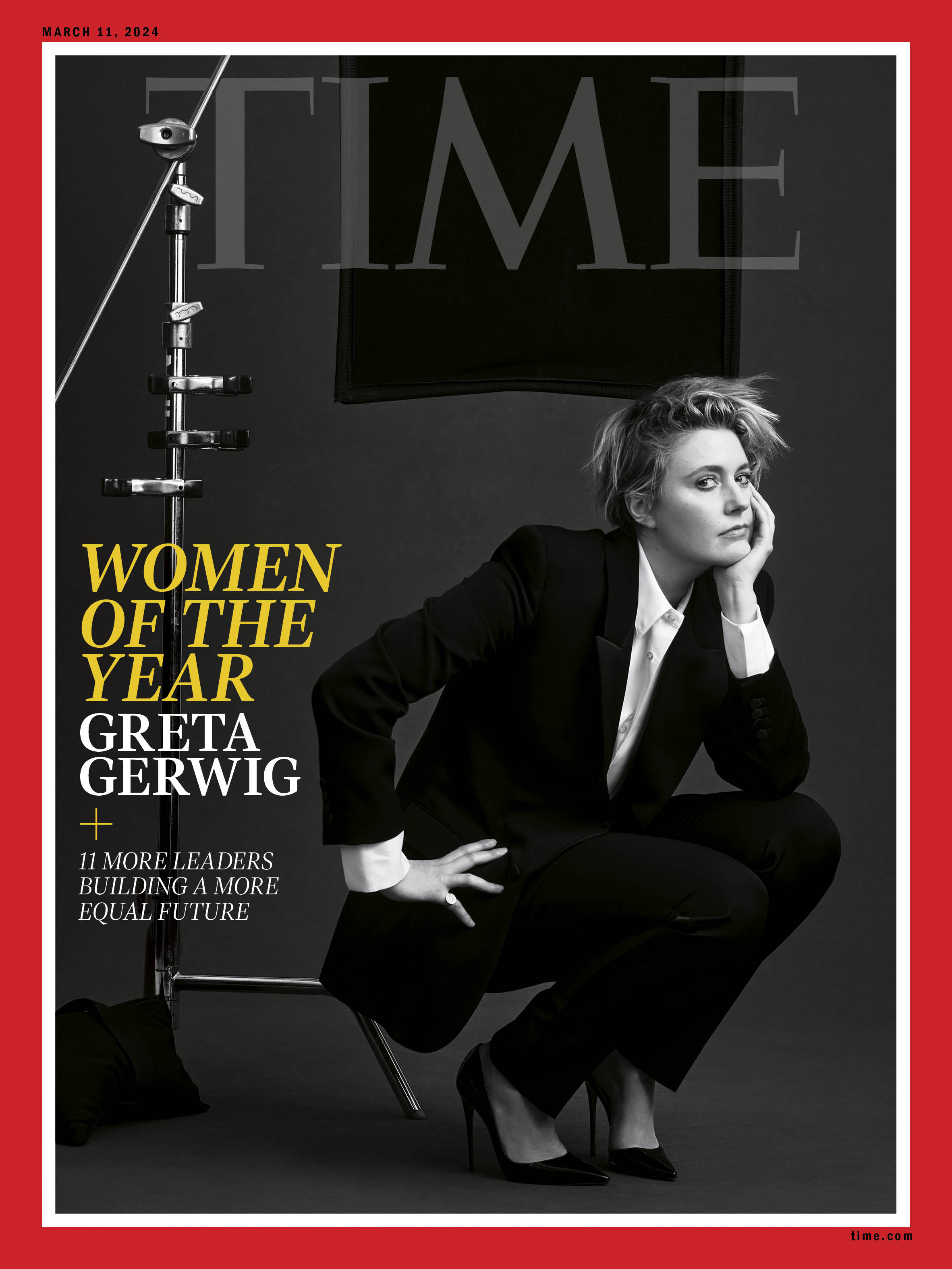The filmmaker Greta Gerwig was in west London the other day when she walked past a movie set—not her own, but something that just happened to be filming on the street—and stopped for a moment to watch. A light was positioned in front of the house; a car pulled up and an actor got out, shaking the gates and yelling. There was an intensity to the scene, and a vulnerability to his performance. Then, abruptly, the spell was broken. Someone yelled: “Cut! Going again.” A groomer ran out to fix the actor’s hair, a mundane but crucial bit of business.

Buy a print of the Women of the Year cover, featuring Greta Gerwig, here
“Movies!” Gerwig says, almost in the manner of an old-timey studio executive, recalling the moment. “Love ’em!” We’re having lunch in Soho; she’s in London while her husband, the writer-director Noah Baumbach, preps production on his next film, and while she works on a new adaptation of the first book in C.S. Lewis’ Chronicles of Narnia series. It’s one of the biggest pieces of intellectual property of all time, but that’s a fitting thing to tackle after what’s been, for Gerwig, a remarkable year. Her dazzling, subversive Barbie, which she co-wrote and directed, grossed more than $1.4 billion at the box office, making it the biggest movie of the year, and the highest-grossing film ever directed by a woman. Barbie has since become a pop-culture phenomenon, from I Am Kenough hoodies to discourse over a third-act monologue delivered by America Ferrera about the impossible pressures women face. Alongside Christopher Nolan’s Oppenheimer, Barbie was credited with keeping the theatrical model afloat last year; in January, the film received eight Oscar nominations, including Best Picture as well as Best Supporting Actress for Ferrera.
“I remember thinking, If this works, everyone is going to think later that it was inevitable,” Gerwig says. “They’ll say, ‘Well, but it was Barbie.’ But this was not guaranteed.”
The success of Barbie means that Gerwig, 40, now has the rare latitude to write her own ticket in an increasingly risk-averse industry—a freedom that could have been immobilizing. But Narnia, Gerwig says, had been gestating for a long time; she’d written a draft before ever setting foot on the set of Barbie. “Knowing that I’d laid the groundwork for Narnia and wanted to return to it—that’s probably something I set up for myself psychologically,” she says. “Because I know the right thing, for me anyway, is to keep making movies. Whatever happens, good or bad, you’ve got to keep going.” Hollywood is still reeling from pandemic shutdowns, strikes, and layoffs, facing omnipresent pressure from Wall Street to turn ever higher profits; in a moment like this one, she feels fortunate to get to do what she loves. “It’s never not astonishing to me that somebody gives you money to make a movie,” she says.
Read More: How Barbie Came to Life
Gerwig’s story is as much about commerce as it is about art: her films are humane, emotional, and playful; she is the only director in history to have their first three solo feature films nominated for Best Picture at the Oscars. Yet her movies also clean up at the box office: her semi-autobiographical solo directorial debut, Lady Bird, grossed $79 million against a $10 million budget; her next, an adaptation of Louisa May Alcott’s beloved Little Women, was budgeted at $40 million and took in $231 million—both extraordinary returns on investment.
These commercial triumphs reflect how her work resonates in the culture, particularly among women and girls, whose emotional lives and ambitions Gerwig explores in her films. But to make her success about gender would be to diminish how her work also transcends its boundaries. “I always think about the intuitive way you love a song or a movie,” she says. “You love something, and you just love it. You don’t think to yourself, ‘I have to love this because it’s by a woman, for a woman.’ That’s part of it. But it’s not why you love it.” She pauses. “You love it because it’s great.”

Though she was raised in Sacramento, Gerwig came up as an actor and writer in the New York City independent-film scene. “Really off the grid,” she says. “Nobody knew we were making these movies, or cared.” That renegade streak is in the DNA of all her work: it takes guts to pitch a vision of Barbie that bluntly contrasts the plastic fantasy of gender equality sold by corporate America with the grim reality for real women. For Gerwig, doing something interesting with what she calls the “known entity” of intellectual property is a healthy challenge: “If you can tell something personal within that structure, you prove you have command over it.”
Read More: How Greta Gerwig Is Leading By Example
I ask her whether the need to prove her command over this space is something women feel more deeply, for the exact reasons articulated in Ferrera’s now famous monologue: there’s an uneasy relationship between women and their ambition in a patriarchal society. “I don’t know if it’s gendered,” she says. “But I know I want to be able to make a body of work that feels like it’s undeniable in terms of the work itself. I don’t want there to be an asterisk next to my name. Do I have more of that than male filmmakers? I don’t know! I know plenty of deeply insecure male filmmakers who are plagued in their own ways.” (I resist the impulse to ask for their names.)
The question of sexism also haunted this year’s Oscar race. While Gerwig was nominated for Best Adapted Screenplay, she was shut out of the Best Director category, while Barbie’s lead and producer, Margot Robbie, was also excluded from Best Actress, despite being acclaimed for her nuanced, layered performance. Fans wondered: Might the movie, or its star, not look like the Academy’s picture of serious filmmaking?
“Of course I wanted it for Margot,” Gerwig says. “But I’m just happy we all get to be there together.” There’s also, she points out, ample accolades for the film at the Oscars. “A friend’s mom said to me, ‘I can’t believe you didn’t get nominated,’” she says, laughing. “I said, ‘But I did. I got an Oscar nomination.’ She was like, ‘Oh, that’s wonderful for you!’ I was like, ‘I know!’”
From here, she says, she wants to make movies at every scale, not just those based on existing intellectual property—although she mimes a performance of Louisa May Alcott and C.S. Lewis rolling over in their graves, groaning, after having their literary masterworks described as mere “IP.” “There is no genre that Greta wouldn’t be great at taking on,” says Steven Spielberg, a mentor and longtime admirer who cites “her range of interest in character studies combined with her instincts as a natural entertainer.”
After the Oscars, she’ll be back to work on Narnia, which she’s been studying closely, alongside the other works of C.S. Lewis, as she prepares to write and direct at least two movies set in that world for Netflix. Ted Sarandos, Netflix’s CEO, calls Gerwig an “incredible visionary” whose take was clear when they first began talking about Narnia. “It won’t be counter to how the audience may have imagined those worlds,” he says, “but it will be bigger and bolder than they thought.” He describes her world building as “rooted in faith,” much like Lewis’ original material.
Gerwig is drawn to the “euphorically dreamlike” quality of Lewis’ writing. “It’s connected to the folklore and fairy stories of England, but it’s a combination of different traditions,” she says.“As a child, you accept the whole thing—that you’re in this land of Narnia, there’s fauns, and then Father Christmas shows up. It doesn’t even occur to you that it’s not schematic. I’m interested in embracing the paradox of the worlds that Lewis created, because that’s what’s so compelling about them.”
Yet as much as Gerwig enjoys a paradox—for proof, look no further than “feminist Barbie”—when she talks about movies, this form that she so reveres, it’s not esoteric. It’s actually really simple. “You don’t need specialized knowledge to watch a movie,” she says. “All you need is your human experience. Everybody knows what it is to love people, and everybody knows what it is to lose people.” In this, she’s an optimist—a true believer that the public will rise to the occasion so long as you trust your instincts, and she continues to trust hers.
“There are a lot of smart people who can guide you along and make your movie the best it can be, but at the end of the day, it’s always you making the choice,” she says. “You’re your own Wizard of Oz, in a wonderful way.” Then she catches herself. “Hang on. No, I guess the Wizard of Oz is a fraud. He leaves on that balloon. It’s Glinda! So maybe you’re some combination of Glinda and the man behind the curtain.”
Regardless, as is the case with so many great films, the message here is a universal one. “The power was always within you,” she says.
Movies—love ’em!
—With reporting by Leslie Dickstein
—
Set design by Danielle von Braun; styled by Karla Welch; hair by John D; make-up by Molly Stern; production by Crawford & Co. Productions
- The 100 Most Influential People of 2024
- Coco Gauff Is Playing for Herself Now
- Scenes From Pro-Palestinian Encampments Across U.S. Universities
- 6 Compliments That Land Every Time
- If You're Dating Right Now, You're Brave: Column
- The AI That Could Heal a Divided Internet
- Fallout Is a Brilliant Model for the Future of Video Game Adaptations
- Want Weekly Recs on What to Watch, Read, and More? Sign Up for Worth Your Time